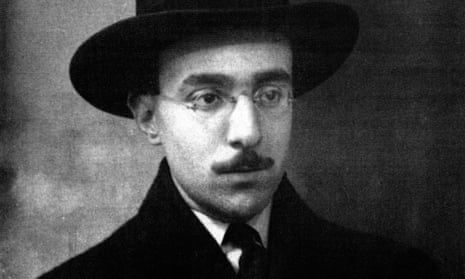In The Book of Disquiet, Bernardo Soares, an assistant bookkeeper in a Lisbon fabrics firm, records impressions he doesn’t expect to see published. “To see and feel,” he says, “makes me feel a great hope, but I realise that hope is literary.”
Anyone who has ever attempted to write something, or begun a large, important project, will know that hope itself can be crippling – the ideal form it could take looms large, even inhibiting us from beginning. Busy, ambitious people are now encouraged to take mindfulness or wellness classes in order to shed their perfectionism. But Fernando Pessoa’s great work offers us a different approach altogether: accepting that dreams needn’t be converted into achievement.
Pessoa, who died in 1935, is now considered Portugal’s finest modernist. He wrote prose and poetry under an array of personae he called “heteronyms”, many of which had their own sub-identities and pseudonyms. But, constructed through 20 years of unpublished writings, Soares is considered the mask closest to the author’s own personality.
Spending most of his time alone, Soares sits thinking, celebrating the “sombre majesty of splendours no one knows”. He advocates buying books never to read them. He fondly remembers an office boy who collected travel brochures, but never travelled. He looks forward to recognition after death not because he expects to achieve something, but as a “present pleasure” – an inert, pure hope. His ideal of retirement involves living “on the outskirts of somewhere or other, enjoying a tranquillity in which I won’t write the works I don’t write now … How sublime to waste a life that could have been useful,” he says, “never to execute a work of art that was certain to be beautiful”.
Here’s the catch: Pessoa himself was both ambitious and prolific. Soares is a literary character, meant to be taken as such and to give pleasure, with a detailed set of beliefs, usually self-contradictory. After declaring himself a dreamer, he says he “despises” dreamers. After declaring himself free of vanity and pride, he calls his own work in progress “the saddest book in Portugal”. “I’m with these poor slobs who have no books to show, who have no literature besides their own soul,” says the writer in the act of writing. The greatest irony of all is that Soares himself is privy to the largest literary ambition there is “to feel everything in every way”.
The Book of Disquiet is funny, life-affirming, and, of course, desperately sad. Soares himself, in the only moment of being seen from the outside, looks like “those who hope for nothing because it’s perfectly useless to hope”. He says he is “timid, with no aptitude for life” and wants “never to be a protagonist”. But that’s where he is wrong, and in being wrong – being the subject of one of the great Portuguese works of literature – gives hope to everyone. But there is something to be said for what Soares prescribes, as a way of strengthening inner resources.
For some people with depression or anxiety, the attention span can take a hit. But The Book of Disquiet, made up of hundreds of short texts that constitute a sort-of narrative, is a perfect match for this drained faculty. Indeed, Pessoa mentioned in a letter to a friend that while writing it, he only had the attention for “little things”. The cause? “Depression.”
The book, as we find it, has a limited attention span itself. Pessoa never finished it, and saw it as notes he would then shape: sentences are left half-done or with gaps to be filled in later that never were, all indicated by a series of symbols by the book’s editor. “All I ask from life is that it ask nothing of me,” Soares says at one point. “To still not have died is enough for life’s wretches, and to still have hope.” There is a break in my edition marked by five stops, indicating that he never finished this thought.
Even if its incompleteness makes it a failed book, it is still one of the very best. Maybe because it is the book that was never written. What we’re left with is the untapped ideal of a book: pure literary hope.

Comments (…)
Sign in or create your Guardian account to join the discussion